Prostatitis is an inflammation of the prostate gland that affects men 20 years of age and older.
According to statistics, 1 in 4 men experienced this disease in one form or another. There has been a persistent trend in recent years to "rejuvenate" the process. This is due to sexual release, an increase in sexually transmitted infections, a trend towards self-diagnosis and treatment of the Internet, and resistance of infectious agents to antibiotic therapy.
This is especially true because in men, the first signs of prostatitis are usually erased, which does not allow you to see a doctor in time and in some cases leads to the development of advanced prostatitis.
Signs of prostatitis in men
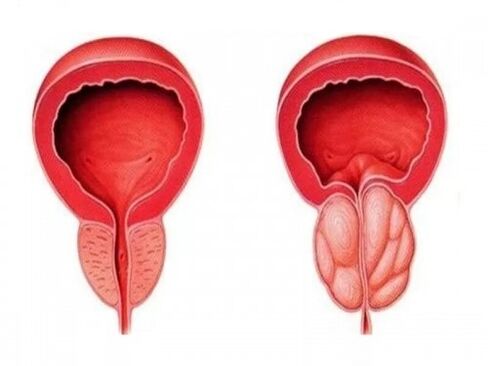
Characteristics of the structure, blood supply, and location of the prostate gland influence the nature of the symptoms that lead to inflammation. These include:
- Pain symptom.
- Symptom of urinary incontinence (dysuricus).
- Symptoms of erectile dysfunction.
Pain symptom
Pain sensations of varying intensity disturb the person in the lower abdomen, perineum, genitals, lumbar spine. This site of pain is due to the presence of neural connections and the involvement of seminal vesicles (vesicles) in the inflammatory process.
The intensity of pain can vary from unexplained discomfort to intense pain that affects a person’s mental state and causes insomnia. Painful feelings depend on sexual behavior and result from a lack of regular ejaculation, or on the contrary, ejaculation, which is associated with the spread of the inflammatory process in the posterior urethra.
Keep in mind that pain in the lumbosacral region may not be associated with the prostate in any way, but may be the result of osteochondrosis of the spine, for example. The outcome of the conversation with the patient and the data from the urological examination will help determine the cause of such pain.
The very first sign of prostatitis in a man is a feeling of pain in the testicles (the area of the scrotum) that spreads along the epididymis (right and left lumbar region). Pain radiating from an inflamed prostate may appear on the inside of the thigh, on the back, which requires that a neurologist be consulted to rule out neurological pathology, as it is not the case that is typical of prostate pain.
In some cases, the irradiation of painful sensations is asymmetrical, allowing the suspicion of an inflammatory process in the prostate that is localized in one of the lobes. At the site of manifestation, the pain syndrome is divided into genitals (in the genital area). , characteristic of congestive chronic prostatitis), extragenital (above the genitals), characteristic of advanced advanced prostatitis) and mixed (chronic prostatitis).
Symptoms of dysuria or urinary incontinence with prostatitis
Disorders of urination are associated with false desires, a feeling of incomplete emptying of the bladder with frequent urination, which is accompanied by inflammation of the bladder and urethral neck. Long-standing signs of dysuria in prostatitis indicate the chronicity of the process.
Erectile dysfunction with prostatitis

Erectile dysfunction in prostatitis is represented by premature ejaculation, blurred feelings during orgasm, decreased libido, and weakened erections. Sometimes a person’s prostatitis can be suspected of not having a morning erection.
The decrease in potency, as the first sign of male prostatitis, is caused by a decrease in the synthesis of testosterone (a male sex hormone).
The manifestation of inflammation of the prostate gland is not limited to the above three symptoms. Often in humans, the first sign of prostatitis is the emptying of prostate secretions from the urethra during defecation (prostatorrhea), indicating a decrease in the muscles of the ejaculatory ducts.
In addition, it is not possible to focus on the psychological signs of prostatitis in men: astheno-neurotic syndrome develops from the nervous system (depression, fatigue, lack of desire for nothing, physical weakness).
First signs of acute prostatitis
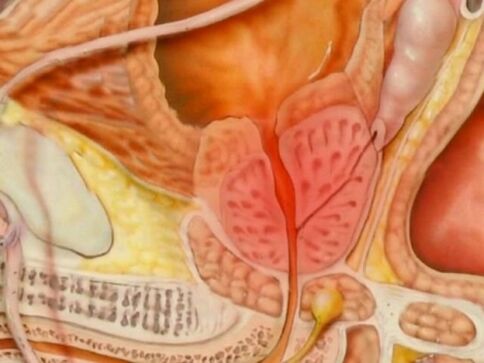
Each of the above symptoms is characteristic of chronic inflammation of the prostate, with acute prostatitis in a man the picture is slightly different.
The disease begins with acute severe pain in the perineum, and the symptoms of the urinary disorder can be more clearly traced. Temperatures rise to 38-39 C, chills, weakness, sweating, muscle and bone pain. When defecating, you are worried about rectal pain. There is no sex life.
If you do not pass the test on time and do not start treatment, the acute process is complicated by purulent prostatitis, all the way to an abscess that leads to emergency surgery.
If there is no other cause (immunodeficiency conditions, severe concomitant pathology, etc. ) - purulent prostatitis in a man - an advanced inflammatory process due to timely access to the doctor!
Signs of inflammation of the prostate
Factors influencing prostatitis have traditionally been divided into 3 groups.
The non-responding factors are:
- Body type.
- Sexual constitution.
- Age factor.
- Presence of diseases.
- Environment (climatic factor).
Factors that can be partially checked:
- Sexual habits.
- Profession.
- Background disorders of the male genitalia.
- Attitude towards the disease.
And finally, verifiable factors:
- Outstanding sex life.
- Alcoholism.
- Failure to follow treatment recommendations.
- Errors in power supply mode.
Who is in danger
Prostatitis threatens men who:
- Adhere to a sedentary lifestyle.
- He suffers from chronic constipation.
- He has a history of sexually transmitted infections.
- She has several sexual partners.
- He suffers from alcoholism and drug addiction.
- They work in cold conditions.
If there are signs of prostatitis, what to do
Laboratory diagnosis of prostatitis
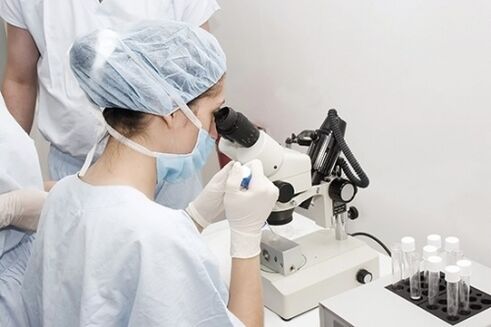
- In KLA, there is an increase in the rate of erythrocyte sedimentation, a shift in the leukocyte formula to the left. In OAM - leukocyturia, proteinuria, bacteriuria.
- Blood for HIV infection.
- Smear from the urethra on the flora. Usually the smear of leukocytes completely. If a sex pathogen (Neisser gonococcus, Trichomonas) is not identified, PCR diagnosis is essential.
- Prostate Gland Secretion: Sowing prostate secretion to determine susceptibility to the pathogen and antibiotic.
- PCR - diagnosis of sexually transmitted infections. The most reliable and fastest way to control a pathogen.
- Blood for PSA Blood for PSA (prostate-specific antigen) should not be taken during the acute inflammatory process in the prostate gland, the result will be unreliable. It is better to perform this analysis 1 month after the end of therapy. It is not necessary for young people under the age of 30 to be tested for PSA levels in the blood. This test is important for a man over the age of 40 because acute prostatitis can be secondary in some cases and the malignancy of the prostate gland is masked. behind its clinical manifestations.
Instrumental diagnostic methods
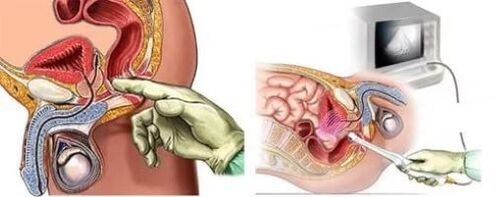
As a general rule, a transrectal (through the rectum) or transbdominal (through the abdomen) ultrasound of the prostate is sufficient.
Signs of prostatitis on ultrasound
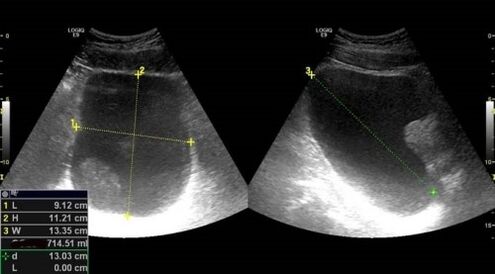
Increase in gland volume, change in texture, edema; with purulent prostatitis - areas of necrosis, deformation of contours, growth of regional lymph nodes.
What you need to pay attention to
First, in order to get rid of the symptoms of prostatitis forever, you need to follow a certain diet.
Exacerbation of prostatitis in a man depends on the irritants consumed with food: hot spices, vinegar, pickles, alcohol.
Alcohol should be specifically mentioned, even its minimal use can negate the effects of long-term complex therapy.
Some patients feel that they need to drink less often or switch to lighter alcoholic beverages. This is their main fault.
Diluted vinegar, kvass, citrus fruits, sauerkraut, tomatoes and cucumbers have no detrimental effect on prostatitis.
Eating fiber-rich foods makes it easier for a person to constipate - this is one of the main causes of congestion in the small pool.
Herbal medicines are good for prevention. Taking herbal diuretics: cranberry leaves, dill seeds, urological collection help to urinate during inflammation.
Exercise, especially improving the blood circulation in the pelvic organs, helps maintain the good condition of the prostate.
The development of inflammation of the prostate triggers hypothermia. It is worth dressing warmer in winter and not staying in a wet swimsuit for a long time after swimming in summer.
Using a condom during sexual contact with an unknown partner will protect you from sexually transmitted diseases, including HIV infection.
Prolonged fatigue has a negative effect on a man’s immune system as well as stressful situations that can increase sleeping infection of the prostate gland. Regular preventive testing by a urologist will help maintain men’s health.



























